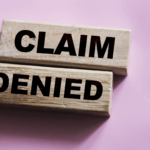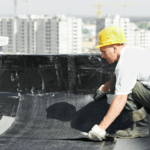
People often assume flames are the most damaging part of fires, however, this isn’t always the case. Even the smallest fire can result in devastating smoke damage that can linger well after the flames have been extinguished. Unfortunately, some business and commercial property owners are unaware of just how dangerous smoke damage can be to their operations. Understanding the potential dangers of smoke damage and knowing whether or not such destruction can be covered by commercial property insurance is incredibly important.
Commercial Fire and Smoke Damage
Property damage due to a fire can be one of the most devastating events to happen to a business. Fires can destroy property, completely interrupt daily business activity, and put the lives and health of workers at risk.
Once a fire is put out, a residue called soot covers all surfaces where the fire was located. For more porous materials, the soot can result in permanent discoloration, leave metal to rust, and cause a yellow tinge to painted walls. Soot can also cause serious threats to the health of people around it. For instance, breathing in soot can result in respiratory distress and other medical emergencies.
There are a variety of common scenarios that can result in the outbreak of a commercial fire and cause residual smoke and soot damage, such as:
Electrical Damage and Malfunctions
Each day, our world relies on the power of tech and electronic materials. Because of this, electrical fires have become one of the most common causes of commercial fires. Things like circuits, frayed wires, and other electrical malfunctions all have the potential to cause a fire. To avoid this, it’s important that commercial property owners have a licensed electrician examine the business’s electrical system regularly. Discouraging employees from using items like space heaters or other electrical devices in an unsafe manner and unplugging all non-essential electrical equipment at the end of the workday can help owners avoid a potentially dangerous situation.
Natural Disaster Events
Natural disaster events like floods, hurricanes, and earthquakes each have the potential to cause significant damage to businesses that can result in a fire. In preventing a fire as a result of natural disaster damage, owners should ensure their property follows appropriate building codes and standards and has a safety plan for employees, customers, and clients that is easily accessible.
Kitchen Fires
Restaurants, hotels, and even office buildings all have the potential for a fire to break out due to kitchen mishaps. Grease fires, malfunctioning equipment, and more can turn a fully functioning kitchen into a major fire hazard. These areas must be equipped with a fire suppression system that all members of the kitchen staff are trained to properly use. Flammable kitchen materials should always be stored away from heat sources, grease buildup must be cleaned regularly, and faulty or old cooking equipment should be replaced.
Smoking-Related Fires
Despite decreases in cigarette smoking over the years, 11.8 percent or 28.3 million U.S. adults identified as cigarette smokers in the most recent year of available data. Not only that, but smoking is still among the leading causes of commercial fires. Business owners are responsible for ensuring a smoke-free workplace and enforcing smoking policies. “No smoking” signs should be posted where needed to deter clients and customers from smoking at the property, and designated smoking areas outside the building should be identified.
Arson
Most commercial fire incidents happen unintentionally. Despite this, arson is still a real threat to any business. While preventing someone with nefarious intentions from starting a fire can be difficult, owners can take preventative measures to mitigate the risk. Surveillance cameras and on-site security can be good deterrents for criminal activity and ensuring combustible materials are located far from windows, doors, and other points of entry can help.
The Hidden Dangers of Smoke Damage
There are many dangers associated with smoke damage. Smoke damage is the general term for the after-effects of a fire. This doesn’t simply refer to the blackened soot left behind once the fire is put out. Rather, smoke damage encompasses the combination of soot, ash, and other fire byproducts that quickly infiltrate a space once a fire breaks out. Not only that, but once a fire breaks out it releases a myriad of chemicals and fine particles that are made up of acidic residue and can adhere to nearly every surface.
Smoke damage is so dangerous because the extent of the damage isn’t always obvious. Some items like furniture or fixtures may not appear damaged but can contain smoke particles that can cause health problems down the road. Walls and surfaces that appear to have been cleaned after the event can also have further damage beneath the surface that must be quickly identified.
Some business owners may assume they can handle the cleanup after a fire on their own, but only a trained professional can properly restore the space once smoke damage is present. This is because cleaning smoke damage requires specific cleaners and equipment to effectively remove it. Most commercial property insurance policies will cover the cost of professional cleaning services after a fire, as well.
Common Mistakes Policyholders Make When Filing a Smoke Damage Claim
In the aftermath of a devastating event like a fire, it can be common for commercial policyholders to make a mistake when filing a claim with their insurance provider. While human error can happen, it’s incredibly important to avoid certain claim mishaps to ensure they aren’t denied by insurers.
Immediately Throwing Away Smoke-Damaged Items
In the aftermath of a fire, it can be incredibly tempting to get rid of foul-smelling smoke-damaged items. Because fires can be incredibly traumatizing, some business owners may throw out their damaged property before filing or fully completing their insurance claims. To ensure the extent of the damage is accounted for, every single potential loss – even items that weren’t necessarily burned – must be documented.
Holding onto all smoke-damaged items can also help if a second or independent appraisal is needed. To ensure these items are well-protected during the claims process, owners should consider storing them in a separate area where they can still be reviewed, or blocking off the part of the facility entirely during the investigation.
Following Improper Recommendations for Smoke Damage Repair
Owners may feel overwhelmed following a fire-related loss, making it easy to follow the advice of an insurance adjuster hired by their insurance provider to appraise the business and its contents. Often, these adjusters will recommend policyholders hire a disaster recovery company that specializes in fire and smoke restoration. These operations will often have insureds turn over their smoke-damaged items, pay their deductible, and allow them to take care of the rest of the claim by billing the insurance company. While this may seem like a godsend amidst all the stress of recovering after a fire, these companies often prey on the vulnerability of devastated business owners by not giving them the full picture.
These services are typically not free of charge and costs can quickly accumulate when restoring fire damage. Bills for these services can total tens of thousands of dollars and are often deducted from policyholder settlements without their knowledge. Not only that, but items being cleaned and/or restored may be returned with residual smoke damage that can still be seen or smelled because the items were beyond repair – despite them being billed and paid for out of the policyholder’s settlement. Items can also be lost entirely during this process, leaving insureds with no means of recovering them.
In these situations, policyholders must remember that insurance providers are for-profit operations that make decisions for claimants, even in the direst of situations, for the benefit of the company over the policyholder. Regardless of who receives the bill, the insured is ultimately the one who gets stuck paying costly cleaning and restoration costs for services that don’t refurbish or replace important business and personal items. Moreover, the chemicals used to clean these items can be just as toxic as the smoke itself, especially for those who suffer from allergies or asthma.
Overlooking Hidden Smoke Damage
Most smoke damage can be hidden, meaning it may be unlikely for an insurance company’s adjuster to detect it during a claim investigation. Smoke damage can permeate the most unlikely areas of your property, like heating and HVAC systems, appliances, and electronics. This damage can destroy or shorten the lifespan of electronics in a few ways. Because the resulting soot can settle in difficult-to-detect places like electronics, the added insulation from the soot can cause overheating. Corrosive chemicals produced by the smoke can also eat away at internal wiring and impair the ability of a device to function properly.
Avoiding Getting a Second Opinion
Just as an insured’s insurance company has the right to review the damage and make suggestions, policyholders have the right to hire a public or independent adjuster to get a second opinion. Doing so can mean the difference between a claim being wrongfully denied and ensuring the legally binding policy is honored by the insurer.
Commercial Property Insurance Claim Attorneys
Smoke damage as the result of a fire can be incredibly challenging for commercial property owners to repair and can cause serious harm if left unattended. The Texas commercial property insurance claims attorneys at Raizner Slania know the roadblocks the insurance industry will put up in an attempt to mitigate damages and costs. We will fight for the maximum amount appropriate for the situation and make the insurance company honor its legal obligations.


